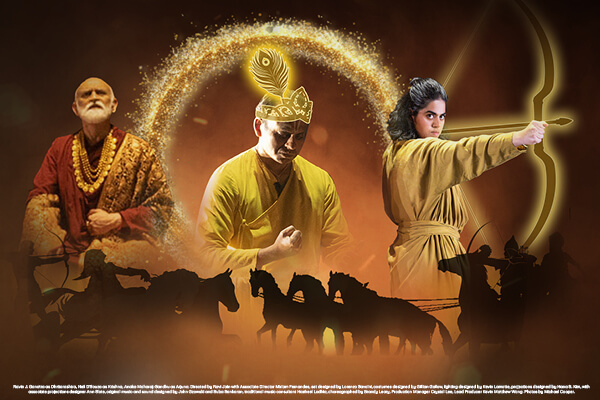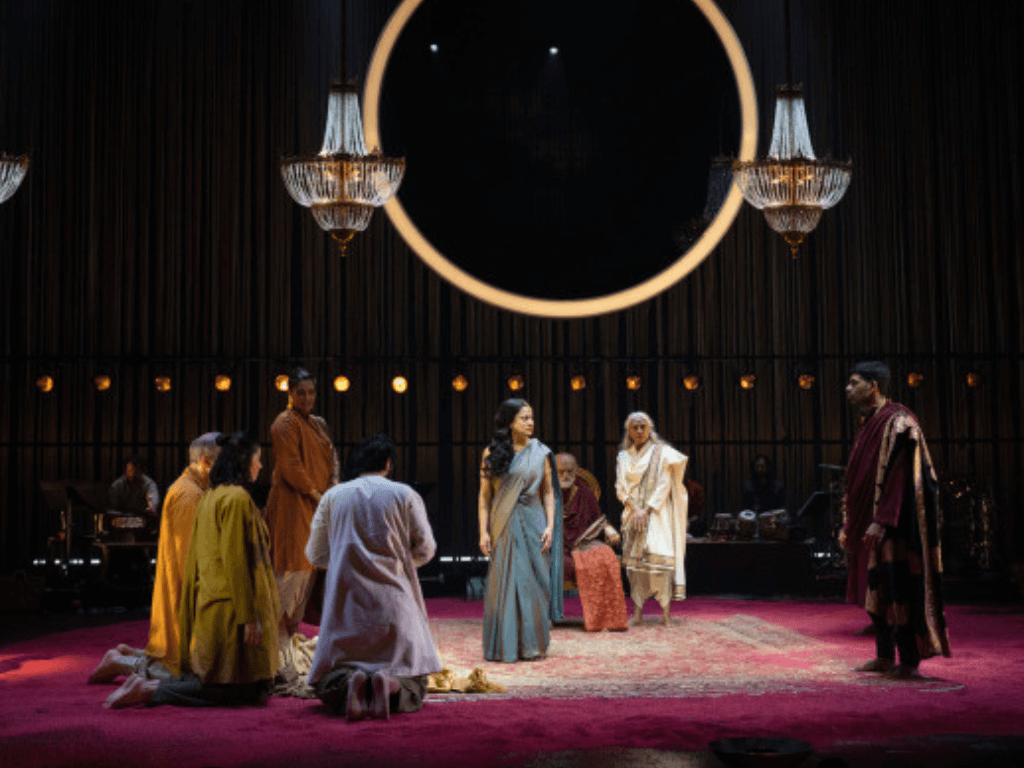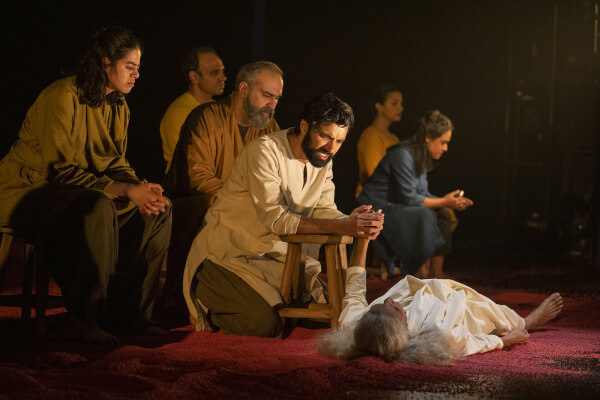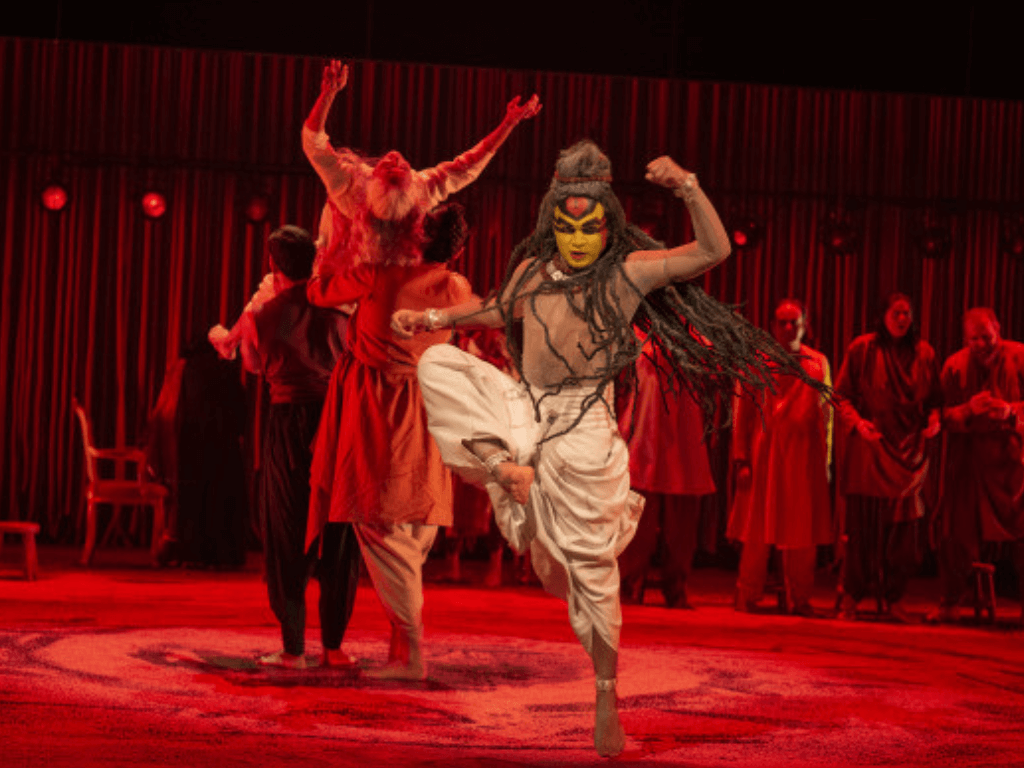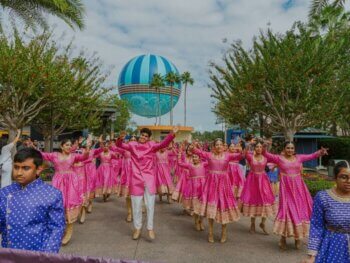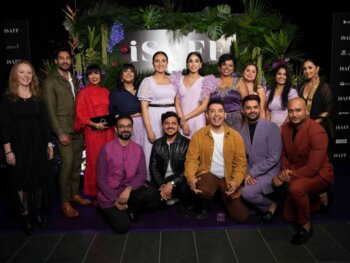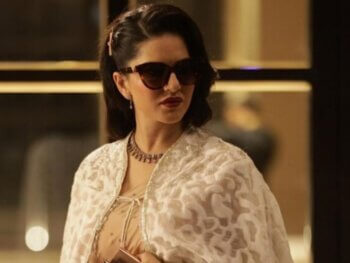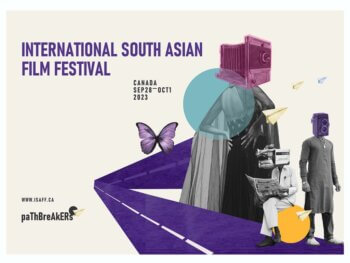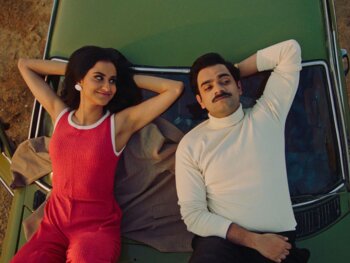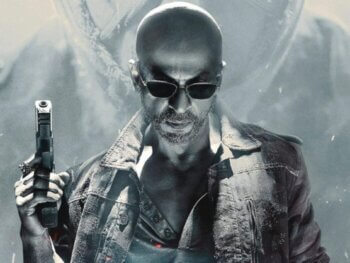Ravi: Absolutely. In our version, the Bhagavad Gita is performed in Sanskrit, actually as a Sanskrit opera. It’s truly an amazing experience for those who are familiar with the Gita, as it’s presented in such a unique way that it blows their minds. And for those who are less familiar, it allows them to deeply feel its essence. A lot of people have responded to that section of our storytelling. That’s in the second part, by the way.
Mehak: Second part, okay
Ravi: Yes, just before the war.
Mehak: Just before the war. Okay, amazing. Miriam, this question is for you. Given the epic scale of the Mahabharat, what were some of the biggest challenges in bringing it to the stage?
Ravi, you can also jump in, too.
Miriam: I think the epic scale itself was the challenge. First, for Ravi and me to digest the story. It took us many years to read not only this version but multiple versions, because, depending on who you ask, there’s a different take on the story, with countless side plots to explore. For us to wrestle the story into something that an audience can follow was a major task.
Then, to bring it to the stage in a way that respects all the versions of the story that came before us, but also feels like our own, this moment for these two creators to tell the story was crucial. We had to ask ourselves: Why do we want to tell this now? What are we offering to the world that’s different from B.R. Chopra’s version from the ’80s and ’90s, which was incredibly important at the time? There was also the influence of the famous theater director Peter Brook.
A British theater director, Peter Brook, did a version of the Mahabharata in 1985, which introduced the Western theater world to the epic.
Ravi: For us, the challenge was to figure out what story we wanted to tell in this moment. What themes did we want to highlight? For us, the central theme became Dharma, which, if you ask anyone, they’ll tell you it means duty, justice, or truth. But for us, we’ve centered around this idea of Dharma as empathy.
Dharma is the law that governs humans, unlike the law of the jungle, where the strong dominate the weak. In nature, the big fish eat the little fish, but as humans, we can’t live in a society where the strong dominate the weak. If that were the case, we’d be no better than animals. Empathy is the foundation of how we can build a civilization. If there is a disparity, it’s the responsibility of the strong to take care of those with less.
How do we live side by side with our neighbors, whether human, animal, or plant life? This idea of empathy and responsibility to the planet became a crucial focus for us in telling the story.
Mehak: Yes, the nuance of your show is empathy. You’re highlighting empathy alongside the storyline of the Mahabharata.
Miriam and Ravi: It’s a major theme, yes. It’s already embedded in the story, and we simply highlight it. What we wanted to communicate is how the lessons of the Mahabharata are still relevant today, especially in the context of the time we’re living in. These lessons feel especially important now.
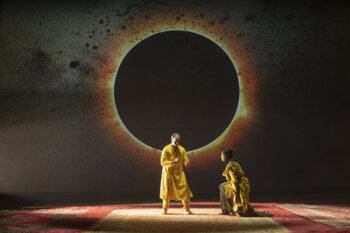
Mehak: Alright, amazing. I also wanted to thank you both for bringing this story to life. Many people aren’t deeply familiar with the background of the Mahabharata.
After the love and appreciation you’ve received from other audiences, what are your hopes for the response in Toronto?
Ravi: Well, you know, honestly, the biggest hope is that they come…
Love to wait until the last minute. And don’t wait to purchase the tickets. It’s going to sell out. The tickets are already going fast, so you’ve got to go now, please. You know, as they say, we know that it’s not common to go to the theater…
And this is the show to see if you ever go once.
Mehak: Yes, I am coming on April 8th.
Miriam and Ravi: Oh, yes, come!
Mehak: So, how does it work? Do you have Part One, and then Part Two later on?
Ravi: So, you can watch Part 1 one night and Part 2 on another, or there are days when you can watch both in one day. For example, you can spend the whole Saturday, from 2 PM until 10 PM, and experience the entire show, with Khana Kahani in the middle.
I think one of the most amazing things for us in Toronto is seeing families come together, grandparents, parents, and kids, all joining in. We hope the community will come out, be a part of this experience, and connect in a way that brings us all together, even without realizing it. So, yeah, go ahead and buy your tickets and come see it!
Miriam: Just to add to what Ravi was saying, so many parents have come with their kids, and they’ve shared how captivated the children are by the story. We had a group of 9-year-olds in Australia who were thrilled about it. I think it’s incredibly meaningful for parents, especially those who grew up with this story, but may have moved here, while their kids aren’t as familiar with it. There’s no better way to introduce kids to this culture and this epic than through this play, because it feels so immediate, exciting, and fun. The kids grasp it, and they go home wanting to learn more about it. It’s been so moving for parents trying to pass on this legacy to the next generation. So, bring your kids, because it truly serves as a fantastic hook.
Mehak: Of course, it’s a very unique and different way to showcase the Mahabharata.
It’s a grand, epic storytelling experience. To all the Desis watching ANOKH UNCENSORED, I strongly encourage you to go buy the tickets because I’ll be there too. It’s crucial to understand the nuances and the deeper concepts of the Mahabharat, as they resonate. And yes, why not? It’s important to learn. If you want to read the Bhagavad Gita, go ahead, but this show will offer so much more insight with visual understanding.
Ravi: Yeah, 100%. And I’m so confident about this, I might even bet someone a coffee. They can email me, but I’m certain, anyone who has any connection to India and sees this show will leave feeling changed.
You will leave deeply moved in some way. One of my favorite comments we ever received was from the very first time we performed it. A person came up to us in the lobby and said, “You know, you’ve made our ancestors proud.” To think about that, the fact that this story has been told for over 4,000 years, it’s truly humbling.
There’s a deep connection, it’s in our DNA. It’s something we can’t even see. So when you experience this,
I promise you, and if you don’t, I’ll buy you coffee. Your DNA will be activated. You will be changed, I promise. I know it.
Mehak: I’m coming on April 8th to watch the first part, and then probably the second part later on. Okay, so the Mahabharata is full of betrayal, power struggles, and epic battles.
If you had to cast a modern Hollywood star as Krishna and Draupadi, who would it be? And why?
Miriam: That’s a hard one, haha!
Ravi: Hollywood star as Krishna – This might be a bit obscure, but there’s a German actor, Christoph Waltz. He’s known for his roles in Quentin Tarantino movies. He has this playful, charming side and can portray both good and bad characters with great skill. He’s an incredible actor. I would cast him as Krishna, though it might not be the most conventional choice for this show.
Miriam: Brad Pitt
Mehak: And what about Draupadi?
Miriam: Someone who’s really who’s fiery and feisty and angry!
Mehak: Angelina Jolie…
Miriam: No, just as I was thinking, Brad Pitt and Angelina Jolie came to mind. People would come to see that show, haha.
Mehak: What has been the most rewarding or surprising part of bringing this production to life?
Ravi: I know it may sound corny, but living with this story for so long has truly changed me, both as a person and as a theater maker. When we started, it felt intimidating, as I think it does for a lot of audiences, whether South Asian or not. It’s a big story, it’s confusing, and there’s so much to follow, it can feel overwhelming to dive into. It took us a long time to get past that. But the more we worked on it, wrote and rewrote, and then shared it with an audience, it became clear why this story has been passed down for so many years.
The reason it resonates with us on such a fundamental human level is that when we listen to it repeatedly, it changes us. Our understanding evolves, and it has the power to transform us.
Miriam: I feel changed by the story, and I know many audience members have shared the same sentiment. So many people have told us that they leave the theater thinking about the story for hours, days, even weeks afterward.
And I think that’s the greatest gift we can give to our audience, the chance to reflect. It’s something I’ve experienced, something Ravi has experienced, and we continue to discover new layers in the story, finding deeper meanings over time.
Mehak: It’s often said that when you’re facing issues in your relationships or family problems, reading and learning more about the Mahabharata can offer a lot of answers. That’s something my grandparents always told me.
Miriam and Ravi: Yes, it is true.
Mehak: Yes!
Why Not Theatre has a reputation for bold, innovative storytelling. What’s next for you both after Mahabharata?
Miriam and Ravi: It’s another bold, innovative story. Just kidding! We’re currently in a phase of thinking about the next steps. But this tour is so massive, after Toronto, we’ll head to Ottawa and then to New York. It’s a big tour, with the whole company being 40 people, so there’s a lot to manage. Once we finish this, we’ll take some time to reflect and think about what’s next.
Mehak: And what about India? Are you guys taking the show to India? People would love it!
Ravi: I know! We’ve been in talks with the Ambani Center in Mumbai, and hopefully, things will work out. It’s also quite expensive to produce, so we’re hoping that people will come, enjoy the show, and be willing to support it financially.
Mehak Kapoor: Thank you so much, Miriam and Ravi, for answering all my questions. To wrap up this interview, this modern retelling of the ancient Sanskrit epic, which has influenced South Asian culture for over 4,000 years, revolves around a family conflict while exploring profound philosophical and spiritual themes.
Presented in two parts, this visually captivating production bridges the past and the present, offering a fresh take on timeless tales.
Thank you all for tuning into this episode of Anokhi Uncensored. It’s been an incredible conversation about the creative vision behind Mahabharat and what makes this production so special.
Don’t miss the chance to experience this epic story live, tickets are available at the link posted. See you at the theater!
Thank you again, Miriam and Ravi, for speaking with me. It was a pleasure. I’ll be there on April 8th and hope to see you both there. If not, I’ll tag you on Instagram!
Miriam and Ravi: Awesome! We’ll be there. We’ll be there. We’ll see you there.
More On The Play
Part One: KARMA – The Life We Inherit
Through a ritual sacrifice, King Janamejaya pledges to avenge his father’s death by snake bite by eradicating all snakes from the world. To end this cycle of vengeance, a storyteller is summoned to narrate The Mahabharata, recounting the saga of the rival Pandava and Kaurava clans and the pivotal choices leading to their infamous Game of Dice. Through playful narration, classical Indian dance, and live music, the ensemble vividly portrays the struggle for justice in the face of jealousy, greed, and ambition.
Part Two: DHARMA – The Life We Choose
The story unfolds with immersive projections, dynamic digital soundscapes, and sweeping scenic design as King Janamejaya learns of the epic war fought by his ancestors. Alongside the King, we experience the legendary battle of Kurukshetra, its catastrophic impact on the planet, and the resilient survivors entrusted with the task of rebuilding. The retelling is crowned with a breathtaking Sanskrit opera adaptation of the Bhagavad Gita.
More Than Just a Play – A Cultural Celebration
Beyond its spellbinding performances, Mahabharata is an immersive cultural experience:
Khana & Kahani (Community Meal & Storytelling): Before select performances of Part 2: Dharma, audiences can gather for an authentic Indian meal and storytelling session, much like families have passed down the Mahabharata for generations. Hosted by two charismatic storytellers, this conversation provides deeper insight into the epic’s themes.
Accessible and Family-Friendly: Special family pricing ensures that this experience is open to all, making it the perfect event for multi-generational audiences.
Convenient Location: Situated in downtown Toronto, just steps from Union Station, attending Mahabharata is easy and hassle-free.
A Must-See Global Event: Following its success at the Shaw Festival, London’s Barbican Theatre, and Australia’s Perth Festival, this is a production that Toronto’s South Asian community can take pride in.
A Global Success – A Proud Moment for Toronto
Originally premiering at the Shaw Festival in 2022, Mahabharata has captivated audiences worldwide, earning critical acclaim at London’s prestigious Barbican Theatre and Australia’s Perth Festival. Now, it returns home for its highly anticipated Toronto premiere before heading to the National Arts Centre in Ottawa and other international destinations.
Why You Can’t Miss Mahabharata
A Theatrical Spectacle Like No Other: Immerse yourself in a production that fuses ancient Indian storytelling with breathtaking visuals and music
A Soaring Sanskrit Opera: Experience a powerful adaptation of the Bhagavad Gita as a Sanskrit opera, a rare theatrical achievement.
Epic Drama, Deep Philosophical Themes: Discover a story that has shaped cultures for centuries, presented in a way that resonates with today’s audiences.
Tickets & More Information:
Dates: Parts 1 & 2 run April 8 through April 27
Location: Bluma Appel Theatre (27 Front St. E.).
Performances take place Tuesday through Saturday at 7:30 pm with Saturday and Sunday matinees at 2:00 pm.
Join the conversation on social media:
Facebook: @cdnstage | Twitter: @canadianstage | Instagram: @canadianstage | #csMAHABHARATA
